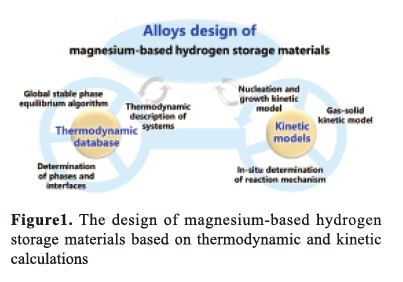Qian Li1,2
1National Engineering Research Center for Magnesium Alloys, Chongqing University,Chongqing 400044, China
2State Key Laboratory of Advanced Special Steels & Shanghai Key Laboratory of Advanced Ferrometallurgy, School of Materials Science and Engineering,Shanghai University, Shanghai 200444, China
EXTENDED ABSTRACT: The complex phase relationships and the quantitative study of phase stability is difficult to carryout in magnesium-based hydrogen storage materials. A global stable phase equilibrium algorithm and a contour calculation method of thermal physical and chemical properties are proposed toconstruct a new thermodynamic model to more accurately describethe multi-component phases. The reaction mechanisms of stable andmetastable phase equilibria in complex systems are unveiled andthe effects of crystal structure and interfacial properties on phasestability are revealed in the model. The rapid and accurate screeningof intrinsic thermal physical properties and macroscopic propertiesis realized in the multi-parameter phase diagram of "composition-temperature-pressure". In order to address the cornerstone problemsof multi-step reactions and the difficult control of each step inthe process of hydrogen absorption and desorption process, theprocesses of multiphase reaction are pioneeringly expressed asan explicit function with influencing factors of time, temperature,pressure,.particleradius,reaction layer.density as well as heatingand cooling rate, etc. Based upon the above-mentioned explicitfunction, the reaction kinetics of the gas-solid phase is expressed by multi-factors. A new concept of "characteristic time" is proposed to reveal the hydrogenation reaction kinetics andmechanisms of hydrogen storage materials. The quantitative description of various physical parameters and the theoretica prediction of complex reaction kinetics and mechanisms are realized. Based on the above-mentioned themmal/kinetic theory, aseries of magnesium-based hydrogen storage materials with outstanding performance are designed.
Keywords: Thermodynamic model; Gas-solid kinetics: Magnesium-based hydrogen storage materials.


Qian Li is a professor (full) and the deputy director of the National Engineering Research Center for Magnesium Alloy Materials at the School of Materials Science and Engineering, Chongqing University. He received his Ph.D. from the University of Science and Technology Beijing in 2004. He has devoted himself into the research of light alloy thermodynamics and kinetics and has undertaken (principal investigator) more than 30 projects at the national, provincial, and ministerial levels, as well as enterprise cooperation, such as the project from 863 program, National Science and Technology Support Program, the National Key Research and Development Special Plan, the National Natural Science Foundation of China, and the Talent Program of the Shanghai Science and Technology Commission. He has published more than 280 science citation index journals and articles, his publications have been cited more than 6,000 times, and a H index of 42. He is named in the world's top 2% of scientists list by Stanford University; He has published 2 Chinese textbooks/monographs and 1 English book chapter. He has applied 88patents with 48 patents authorized, and 8 of them were transferred for commercialization. He is an associate editor of JMST and editorial board member of JMA, JMI, IJMMM, etc. He has received numerous scientific and technological awards/honors, such as the "International Magnesium Science and Technology Award" Annual Excellent Academic Paper Award, the China Nonferrous Metals Industry Science and Technology Award (ranked #1), and the China Nonferrous Metals Innovation Award (individual award). He was awarded the National Natural Science Foundation of China Outstanding Young Scientists Fund (2012), Shanghai Leading Talents (2020), Chongqing Talents Innovation Leading Talents (2022), Ministry of Education "National Excellent Doctoral Thesis" (2006), Shanghai Shuguang Scholar (2014), Shanghai Science and Technology Commission Young Science and Technology Star (2006) and Tracking Program (2011), etc.